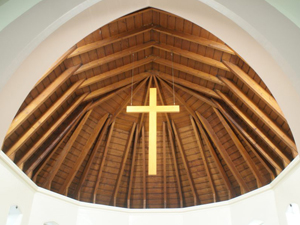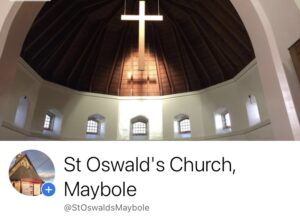On Sunday 30th September we had our Harvest Thanksgiving service and welcomed the Rev Chris Blackshaw as our guest preacher. Chris is the Pioneer Farming Minister for the Church of Scotland and supports the farming community within the Presbytery of Ayr.
Sermon for Harvest – The Rev Chris Blackshaw
Joel 2:18-27
Then the Lord will pity his people and jealously guard the honour of his land. The Lord will reply, “Look! I am sending you grain and new wine and olive oil, enough to satisfy your needs. You will no longer be an object of mockery among the surrounding nations. I will drive away these armies from the north. I will send them into the parched wastelands. Those in the front will be driven into the Dead Sea, and those at the rear into the Mediterranean. The stench of their rotting bodies will rise over the land.” Surely the Lord has done great things!
Don’t be afraid, O land. Be glad now and rejoice, for the Lord has done great things. Don’t be afraid, you animals of the field, for the wilderness pastures will soon be green. The trees will again be filled with fruit; fig trees and grapevines will be loaded down once more. Rejoice, you people of Jerusalem! Rejoice in the Lord your God! For the rain he sends demonstrates his faithfulness. Once more the autumn rains will come, as well as the rains of spring. The threshing floors will again be piled high with grain, and the presses will overflow with new wine and olive oil. The Lord says, “I will give you back what you lost to the swarming locusts, the hopping locusts, the stripping locusts, and the cutting locusts. It was I who sent this great destroying army against you. Once again you will have all the food you want, and you will praise the Lord your God, who does these miracles for you. Never again will my people be disgraced. Then you will know that I am among my people Israel that I am the Lord your God, and there is no other. Never again will my people be disgraced.
What do you get if you cross an elephant with some locusts? I’m not sure, but if they ever swarm – watch out!
The Prophet Joel was one of the earliest of the Old Testament’s prophets, writing between the 5th and 9th century BC. The people in Joel’s day had just experienced considerable devastation that had been caused by locusts. This was then followed by a severe drought. The devastation that this wrought crippled their economy and caused incredible suffering, not only for the people, but for the land and the animals. A large swarm of locust can eat 200 tonnes of vegetation a day. Last year in our own area farmers experienced hardship with the weather too; it began being very wet from the end of July and it continued through the winter until late spring. Farmers did then, and still are, feeling the effects of this bad weather, funnily enough it was followed by a drought during the summer. So in some ways we can draw similarities between Joel’s era and our own.
The book of Joel was written to the people of God. It was written to God’s people who had strayed from their walk with him. It was written for those believers who had become spiritually lethargic. They didn’t attend to the means of grace. They didn’t read God’s Word. They seldom prayed. They attended worship services, but if something else came up, then they missed worship services. This word is for you and for me: return to God in wholehearted repentance.
Joel used the plague of locusts as an example of what moving away from God can do and to deliver God’s message to his people. Joel urges people to pay attention to what God is saying to them, through the circumstances they find themselves in. He compared the locust plague to the “day of the Lord or the Day of Judgment and Blessing. Even though no specific sin was mentioned by Joel in his book, it seems that the sin of the people was that they had wandered away from God’s teaching. God urged his people, through Joel’s message, to return to him with all their heart. Apparently, the people of God heeded God’s warning and returned to him in repentance. God then restored his people because of their repentance.
The Sistine Chapel is one of the true jewels of the art world. After spending four years painting it, Michelangelo finished his masterpiece in 1512, and the chapel went into daily use. In those days the only light came from candles. As candles burned year after year, the soot began to obscure the paintings and after over 400 years of soot, grime, and dust collecting on the ceiling, the original paintings needed to be cleaned and restored to their former glory. So a team of artists began work to restore the Sistine Chapel in 1984 and they continued working on it until 1999 when it was finally restored. Suddenly the colours were restored to their original beauty. Prior to the restoration process, many in the art community thought that Michelangelo was a genius at composition. After all, how did he think to have Adam’s hand stretching out, yearning to find the finger of God, which was already reaching out to him? But it was widely believed that the colouring Michelangelo used was second rate. It had been described as being too dark, monochrome and dull.
And yet when they restored those frescoes to their original state, everyone could see the beautiful fresh, and even spring-like colours; there were pale pinks, apple green, vivid yellow, and sky blue against a background of warm pearly grey. When the maker’s true brilliance and goodness were revealed, people had to change their assumptions about Michelangelo. In a similar way, for many of us, over the years the soot, grime, and dust of daily life has obscured our vision of God’s goodness. To some people God’s character may seem dull, mediocre, and maybe even dark. Some may no longer feel and deeply believe that through Christ they have a heavenly Father. However, by calling us to repentance, God begins a work of restoration within us so that we can see the true colours of his brilliant goodness.
The people in Joel’s day certainly had an obscured vision of God that left them spiritually weary. That is why God called to them through the Prophet Joel to return to him in repentance. Today we have heard how God restores all who return to him in wholehearted repentance. In the previous section of Joel’s prophecy, he had urged the people to return to God in repentance and they had responded to him.
Joel mentions four specific blessings of restoration. Firstly, the Lord will answer your prayers. Undoubtedly, during the devastation of the locust invasion, the people had called out to God. Joel had been sent by God to tell the people that they needed to repent of their sin of spiritual complacency. Finally, they did so, and the Lord answered their prayer. Sometimes you and I can experience some kind of disease, difficulty, or disaster. In such instances, we should always ask is God trying to teach us something through these difficult times?
Have we sinned against God, or simply become spiritually lethargic. Let us repent of our sin and our spiritual lethargy, and we can be sure that the Lord will answer the one who returns to him.
Secondly the Lord will satisfy our desires. God says through Joel, “Behold, I am sending to you grain, wine, and oil, and you will be satisfied”. The crops destroyed by the locusts will be restored again, and God’s people will be satisfied. In the story of Jesus feeding the five thousand Luke says that “they all ate and were satisfied”. Jesus’ power to satisfy the physical needs of so many people is an illustration of his ability to satisfy the spiritual needs of every single person who turns to him in repentance. In the New Testament there are so many examples of Jesus satisfying the needs of people.
Thirdly the Lord will remove your blame. God says in I will no more make you a laughing stock among the nations.” When the locusts devastated the land, the surrounding nations sneeringly said of God’s people, “Where is your God? God’s people were a mockery among the nations. But with God’s restoration of his people, he removed that mill stone from around their necks. Sometimes we may find ourselves caught up in sin and our reputation is tainted by rumours of truth and half-truths, commit the matter to the Lord. Concentrate on returning to God, and he will see to it that our burden is removed. Time will tell the truth, and God’s business is restoring the ruined reputation of straying sinners.”
And fourthly the Lord will destroy your enemies. God says “I will remove the northerner far from you, and drive him into a parched and desolate land, his frontline into the eastern sea, and his rear guard into the western sea; the stench and foul smell of him will rise, for he has done great things.” It seems to me that there is a play on the word “northerner.” On the one hand, it refers to the locusts, which God had driven into the seas. On the other hand, it also refers to the Babylonians that would invade Judah centuries later. Again, God would eventually deliver his people from the Babylonians, for he has done great things. In any case the term Northerner is one that holds a sinister connotation.
The enemies you and I face today are not primarily human enemies; our enemies are the world, the flesh, and the devil. As we return to God in wholehearted repentance, he destroys our enemies so that we are enabled to continue working in obedience to God.
God says in verse 21, “Fear not, O land; be glad and rejoice, for the Lord has done great things!” The land was the first to suffer when the locusts attacked and devastated the land. Now, the land is the first to be restored. Fear not, you beasts of the field, for the pastures of the wilderness are green; the tree bears its fruit; the fig tree and vine give their full yield.” The animals were also severely affected by the locust plague. Now, there is plenty for them to eat as well, as God restores the beasts of the field. “Be glad, O children of Zion, and rejoice in the Lord your God, for he has given the early rain for your vindication; he has poured down for you abundant rain, the early and the latter rain, as before.” Finally, the children of Zion, that is, the people of God, will be restored by God himself. And they are to rejoice in the Lord their God.
This summer my fields were parched, the grass stopped growing and our animals had little food to eat. Many farmers were having to feed the crop they had just harvested to their animals. But then the rains came again and the grass became green again and it grew. We were once again blessed. How should we respond when the Lord starts blessing us in these immeasurable ways? Well we should gratefully receive the Lord’s blessings, stop being afraid, and live in happiness. I had a tremendous sense of relief when the grass began to grow again, as did many other farmers. Because of what the Lord does in response to our repentance, rejoice! Don’t sink into depression over past sins and losses. Don’t dread the consequences of earlier failures. Don’t assume a complete restoration is too good to be true or beyond God’s capability. Rejoice wholeheartedly over the Lord’s ability to restore by grace.” What God has done in restoration is amazing. The barren land will start producing crops again. The beasts of the field will have plenty to eat again. And God’s people will also be restored and will rejoice. Can it get any better? Amazingly, yes it does!
In verse 24 God says that “the threshing floors shall be full of grain; the vats shall overflow with wine and oil.” There will be material blessing for the people of God. But, even better than that, God says in verse 25, “I will restore to you the years that the swarming locust has eaten, the hopper, the destroyer, and the cutter, my great army, which I sent among you.” This is surely one of the most precious promises of God. When God says, “I will restore to you the years that the swarming locust have eaten….” That is an amazing promise. God loves to restore what has been lost. He delights in restoring wasted years. He rejoices over sinners who repent and return to him.
Do we mourn over the lost years of our life? Do we think back with bitterness of soul as we remember the wasted years of youth when we did not serve the Lord? Was it twenty, thirty, forty, fifty or sixty years before we humbled ourselves in repentance before our Maker? The Lord restores the years the locust has eaten—all of them. Have we spent a number of years living in a luke warm faith, doing only what pleased us? Have we made a number of serious mistakes in our life? Did we make some hasty decisions that we now regret? Do we often contemplate about those decisions and the effect they have had on our lives? Did we leave school too early? Did we make a hasty choice in marriage? Did we fail to recognize our perfect partner? Have we gone through a divorce or an abortion? Did we make a bad business decision? Did we lose a large amount of money in speculative investments? Did we miss out on the investment opportunity of a lifetime? Did you move your family when you should have stayed where you were? Did you lack faith to move out when the opportunity presented itself? Did you fail to buy a house when the market was right? Did you buy a house when you really couldn’t afford it? Did you rebel against the wise advice of your parents when you were a teenager? Did you commit a moral crime at one point in your life, a crime that haunts you even today? Do you live in mortal terror that somehow people will discover the great mistakes of your past? My friends God will restore to you the years that the swarming locust have eaten! He gives back everything that you have lost, and more beside. The great example of this is of course Job in the Old Testament. Job was under fierce attack from Satan, and lost ten children and a massive amount of wealth. Nevertheless, he remained faithful to God, and in the end, God gave Job twice as much as he had before.
Living with regrets is not compatible to being a Christian. Living with regret means that we refuse to believe the glorious truth that God restores the years that the locust have eaten. Do we mull over our past failures? Do we let our thoughts feed morbidly on the sins of our past? Believe in God and start rejoicing in faith. Look your failures straight in the eye, and listen to Satan’s accusations no more. Trust fully in God’s ability to restore the years the locust have eaten.
Let me close with these words “Repentance is God’s way of revival. Returning to the Lord in humility is the way to receive all his blessings. In response to our repentance, he will restore the years that the locust have eaten.” So when we think things have got really bad and we are at our wits end then that is the time to grow closer to God. Recently I had one of those delightful letters from the tax office telling me that they are altering my tax code and as a result I am now having to pay them an extra £600 a month. I was scared and extremely worried because I knew I could not afford this loss. For two days I was worried sick but then I thought I need to take this to God. So that is what I did and I had a strong feeling to go and to see a different tax consultant. And as a result I have found that I can now off set my farming enterprise against my tax so instead of me paying them they now owe me. Praise God.
What I’m trying to say is I took it to God and he brought me through this difficulty and he will do the same for you with difficulties you are experiencing.
I leave you with the words of Joseph Scrivens hymn:
What a friend we have in Jesus,
All our sins and griefs to bear!
What a privilege to carry
Everything to God in prayer!
Oh, what peace we often forfeit,
Oh, what needless pain we bear,
All because we do not carry
Everything to God in prayer!
Amen.



